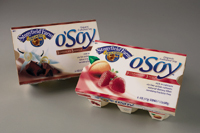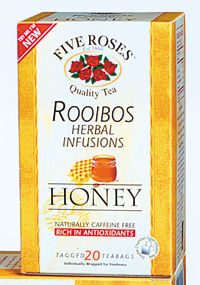Healthy Halos

According to Leatherhead Food RA, Surrey, U.K., the global market for functional food is over $30 billion and estimates that it will eventually reach 5% of total world food expenditures in developed countries. LFRA defines the functional food market as a variety of healthy products not necessarily making health claims, but often perceived as functional foods.
Market researcher Frost & Sullivan reports the U.S. functional beverage market generated revenues of $4.7 billion in 2000, and expects this figure to top $12 billion by 2007.
Sales in the dietary supplement industry--cousin to functional food and a precursor of nutritional product trends--have slowed, plagued by a mature marketplace and unfavorable media generated from sources such as ConsumerLabs.com, an organization that publishes inauspicious laboratory analysis of dietary supplements.
However, the fortune of products within that category individually soar or stumble. For example, Information Resources Inc. (IRI), Chicago, reports sales of cayenne supplement fell 41% and garlic dropped 20% (52 weeks ending December 31, 2000). In contrast, green tea was up 39%, guarana 49% and soy 116% over the same time period.
Such nutraceutical trends influence the food industry. The popularity of green tea, for example, was not lost on the food companies that introduced 79 green tea-containing foods in 2000. While most were beverages, such as Rivella USA's Swiss Soda (Boca Raton, Fla.) and Stash Teas' organic line (Tigard, Ore.), some added green tea to their food products. Natural Quick Foods, Seattle, incorporated a green tea extract in their Potato Curry pocket sandwich, and Imagine Foods, San Carlos, Calif., added green tea to its line of frozen soy non-dairy desserts.
As cutting-edge food companies dabble in green tea, the natural products industry stays a step ahead. Onda Tea, Santa Barbara, Calif., touts Yerba Maté, an upcoming "energizing" and nutrient-rich tea from South America. National Brands Ltd.'s Five Roses brand (Rivonia, South Africa) rolled out Rooibus tea from a South African plant known for its high antioxidant content. (See Functional Foods...Back to the Future, PF, March, 2001, p. 35.)
As supplement sales have flattened, traditional supplement marketers such as Natrol, Chatsworth, Calif., have expanded into functional foods. The company recently introduced Calci-Delite peanut butter chocolate and chocolate-dipped strawberry health bars (with folic acid and 100% of the daily value for vitamin C and calcium). On the heels of Evansville, Ind.-based Mead Johnson's successful Viactiv brand chews (supplements constructed much like a caramel), Natrol introduced honey vanilla flavored GlucoChews with 500 mg glucosamine and 200 mg chondroitin.

Beverages and Bars
Beverage and health bars are not only convenient "food forms" for consumers who eat on the run, but are convenient for manufacturers to plug in the nutritional ingredient of the moment. These products not only function as signposts of popular ingredients, but also show strong category growth.Tracking scanner data from mass merchandisers, drug stores and supermarkets, IRI pegs the snack bar/granola bar market at $1.37 billion (52 weeks ending 1/28/2001), a 9.1% overall increase with 28.6% growth in drug stores over the prior year. Untracked sales in health food and convenience stores kick the figure higher.
While a conventional tactic is to organize functional products according to type of food, such as dairy products with probiotic cultures and prebiotic dietary fiber, or spreads with cholesterol-lowering phytosterols, categorizing them according to their disease-risk reducing properties positions them more similarly to pharmaceuticals, which increasingly compete against functional food.
With this approach, the rise and fall of many products becomes more predictable since their fortunes are driven by clinical research. Glucosamine's benefits for osteoarthritis received strong support with a highly publicized and favorable study published in the January 26, 2001 issue of The Lancet medical journal. Will the mostly positive press and research on vitamin E and its role in both cancer and coronary heart disease prevention make this ingredient the next "big thing?"
Continued positive research, and more importantly, FDA-approved cardiovascular benefit claims maintain soy as the "in" health component--both as an ingredient and as a food's base (See Soyfoods article on p. 63). Several processors, such as Sunrich Inc., Hope, Minn., are marketing soybeans as a frozen green vegetable, often using the Japanese name "Edamame" for the in-the-pod form.
Soy's popularity as a vegetarian option may be given another push by mad cow disease, recently hyped on the March 12th cover of Newsweek. However, opportunities exist for other meat replacers as well. Quorn Foods, Riverside, Conn., is introducing a line of mushroom or mycoprotein-based entrées--long popular in Europe but not seen in the U.S. market, says Lynn Dornblaser with Mintel's GNPD. Quorn Foods has applied for FDA approval of the mycoprotein component.
Research and health
scares will continue to drive the whims and wishes of the North
American consumer. However, whatever the future brings for new functional
foods, it's likely to be a healthy category. PF
Making a Claim
(New Products or Product
Lines Introduced in the U.S. in 2000)
| Supplements/ | |||||
| Health Condition | OTC (%) | Beverages (%) | Health Bars (%) | Other (%) | Examples of Other |
| Immune (62) | 15 | 73 | 0 | 13 | Pet foods, majority |
| Heart health (59) | 15 | 56 | 8 | 12 | Cereal, soy-based |
| meat substitutes | |||||
| Diabetes (24) | 29 | 33 | 13 | 25 | Cereal, sweetener |
| Osteoporosis (23) | 13 | 70 | 9 | 9 | Pet food |
| Cancer (4) | 25 | 50 | 0 | 25 | Snack mix |
Mintel's Global New Products Database stores information on consumer products introduced around the world. Using keyword searches, a tally was made of food and dietary supplement products introduced into the North American market in 2000 that made claims or positioned themselves as being beneficial for disease conditions. For example, terms used for heart health included coronary, cardiovascular, cardio, etc. "Circulation" benefits were considered too vague. Of the 59 products found, over half fell into the dietary supplement category, although a range of primarily soy-based foods from General Mills' Multi Grain Cheerios to Mrs. Leeper's Organic Soy Pasta also made heart-health claims.
Looking for a reprint of this article?
From high-res PDFs to custom plaques, order your copy today!
 Claudia Dziuk O'Donnell is Chief Editor and Associate Publisher of Prepared Foods magazine including its NutraSolutions and Culinary sections. Her responsibilities include determining the editorial content of the print publication and the New Products Conference.
Claudia Dziuk O'Donnell is Chief Editor and Associate Publisher of Prepared Foods magazine including its NutraSolutions and Culinary sections. Her responsibilities include determining the editorial content of the print publication and the New Products Conference.

